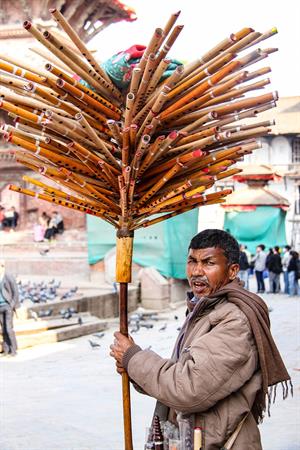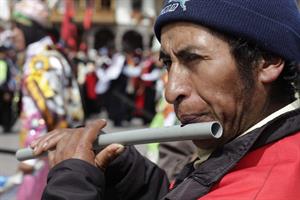
PUMPA - SMART LEARNING
எங்கள் ஆசிரியர்களுடன் 1-ஆன்-1 ஆலோசனை நேரத்தைப் பெறுங்கள். டாப்பர் ஆவதற்கு நாங்கள் பயிற்சி அளிப்போம்
Book Free Demo6. I look at the flute seller standing in a corner of the square near the hotel. In his hand is a pole with an attachment at the top from which fifty or sixty bansuris protrude in all directions, like the quills of a porcupine. They are of bamboo: there are cross-flutes and recorders. From time to time he stands the pole on the ground, selects a flute and plays for a few minutes. The sound rises clearly above the noise of the traffic and the hawkers’ cries. He plays slowly, meditatively, without excessive display. He does not shout out his wares. Occasionally he makes a sale, but in a curiously offhanded way as if this were incidental to his enterprise. Sometimes he breaks off playing to talk to the fruit seller. I imagine that this has been the pattern of his life for years.
Explanation:
Later in the day, Seth observes a flute seller standing in the corner of the square near the hotel.

A flute seller with protruding flutes
The seller was holding a pole from which about fifty or sixty bansuris (bamboo flutes from the Indian subcontinent) were sticking out in all directions. Seth comments that the protruding flutes looked like porcupine quills.

A porcupine with its quills
The seller had cross-flutes and recorders, both made of bamboo, tucked into his pole.
A cross-flute, also known as transverse flute, is held horizontally and is side-blown. A cross-flute is often associated with Lord Krishna in India.
A cross-flute, also known as transverse flute, is held horizontally and is side-blown. A cross-flute is often associated with Lord Krishna in India.

A man can be seen playing a cross-flute
Recorder, on the other hand, is a flute that is held vertically and is blown downwards. Moreover, a recorder's mouthpiece resembles a whistle.

A girl plays a recorder
Back to the lesson, Seth notes that the seller was in the habit of doing something: he places the pole on the ground from time to time, selects a flute, and plays for a few minutes. He probably does that to attract customers, to let them see what they could do with a small flute.
As the seller plays his notes, the music slowly rises above the noise of the traffic and the cries of the hawkers. He plays quietly, meditatively, and without excessive display. Unlike the rest of the hawkers, he doesn't call out his products loudly. He doesn't have to, for he makes the presence of his wares known through his music.
The flute seller doesn't seem too keen on selling or making profits. He occasionally sells a flute or two, but in an oddly casual manner, as if it were unrelated to his business.
The seller also takes a break from playing occasionally. And he would indulge in a conversation with his neighbouring seller, the fruit vendor. Seth believed that this had been his routine for years.
As the seller plays his notes, the music slowly rises above the noise of the traffic and the cries of the hawkers. He plays quietly, meditatively, and without excessive display. Unlike the rest of the hawkers, he doesn't call out his products loudly. He doesn't have to, for he makes the presence of his wares known through his music.
The flute seller doesn't seem too keen on selling or making profits. He occasionally sells a flute or two, but in an oddly casual manner, as if it were unrelated to his business.
The seller also takes a break from playing occasionally. And he would indulge in a conversation with his neighbouring seller, the fruit vendor. Seth believed that this had been his routine for years.
Meanings of difficult words:
S.No | Words | Meanings |
1 | Square | An open, typically four-sided, area surrounded by buildings in a village, town, or city |
2 | Pole | A long, thin stick of wood or metal, often used standing straight up in the ground to support things |
3 | Bansuri | A bamboo transverse flute of northern India |
4 | Quill | The hollow sharp spines of a porcupine, hedgehog, or other spiny mammals |
5 | Porcupine | A large rodent with defensive spines or quills on the body and tail |
6 | Meditatively | Doing something seriously, and yet in a relaxed manner |
7 | Excessive | More than is necessary, normal, or desirable |
8 | Wares | Articles offered for sale |
Reference:
National Council of Educational Research and Training (2006). Beehive. Kathmandu- Vikram Seth (pp.127 - 131). Published at the Publication Division by the Secretary, National Council of Educational Research and Training, Sri Aurobindo Marg, New Delhi.